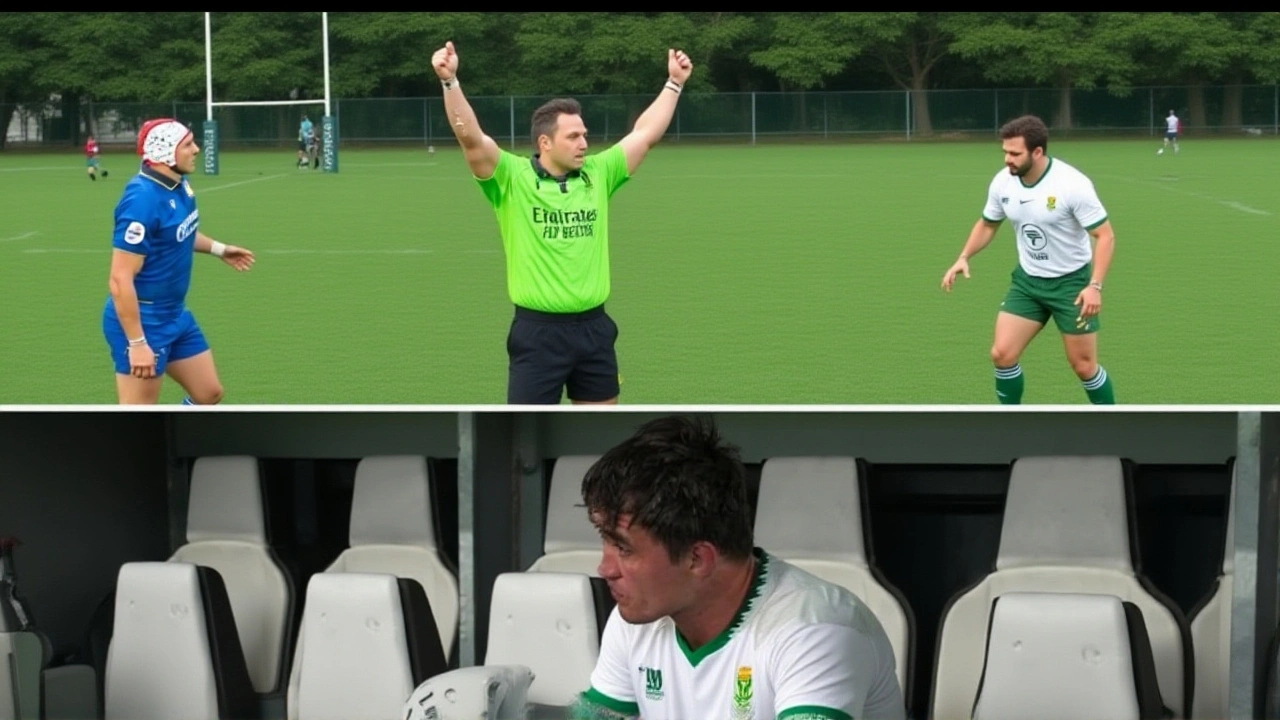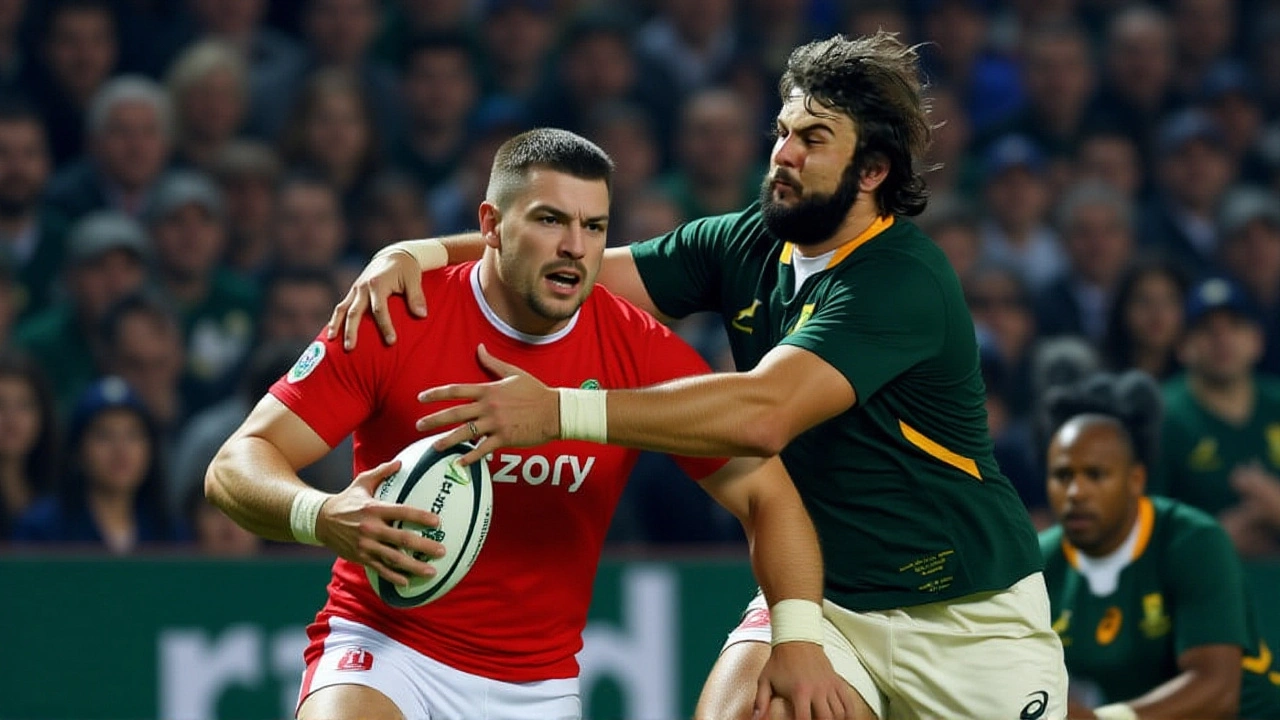Springboks Crush Italy 32-14 in Turin as Van den Berg and Pollard Seal Dominant Win

When the final whistle blew at Allianz Stadium in Turin on November 15, 2025, the South African Springboks didn’t just win—they dismantled Italy’s hopes with clinical precision. The 32-14 victory wasn’t pretty in the first 40 minutes, but it was devastatingly effective in the second. Over 31,000 Italian fans watched their team dominate possession, only to watch South Africa turn defense into destruction. This was the 19th meeting between the sides since 1995, and the Springboks’ 18th win. Italy’s lone victory? 2016. And now, with a new generation of players, they’re still chasing ghosts.
The Turning Point That Broke Italy
It wasn’t one moment. It was two. First, at the death of the first half, with the score locked at 3-3, the Springboks won consecutive scrum penalties. Italy’s defense, stretched thin, collapsed. Marco van Staden surged through a gap like a freight train and grounded the ball under the posts. That 10-3 lead wasn’t just points—it was psychological. Italy had controlled the ball, but South Africa controlled the rhythm. Then came the 48th minute. Italy, with a five-meter line-out and numbers on the edge, had their best chance to tie or take the lead. The ball was cleanly thrown, the maul set. But the Springbok defense—led by Ethan Hooker and Handre Pollard—held firm. A turnover. A penalty. Pollard kicked it. Then, from a scrum five meters out, Morne van den Berg popped the ball to the back, and the Springboks’ young lock surged over. 17-3. The belief in Turin cracked. And it never recovered.Van den Berg’s Masterclass
The standout wasn’t the try-scorer or the kicker. It was Morne van den Berg. With 51 passes and 12 kicks, he didn’t just play fly-half—he conducted the entire match. He slowed it down when Italy was surging. He sped it up when the defense was tired. He didn’t need to score. He just needed to make Italy’s defense second-guess every decision. His 12 kicks weren’t just tactical—they were emotional. Each one sapped Italian energy. Each one forced them to chase. By the 65th minute, they were running on fumes. And when Ethan Hooker darted through a gap in the 79th minute, weaving past two defenders with footwork that looked more like soccer than rugby, it wasn’t just a try. It was a statement. The Springboks’ coaching staff had been watching him in training for months. This was the payoff.
Italy’s Missed Moments
Italy’s Paolo Garbisi had a nightmare. He missed two penalties in the first half. He missed a third in the 52nd minute—right in front of the posts, with the score 17-6. The crowd groaned. The YouTube match review captured it perfectly: “Gasi not having a great night with the tea.” It wasn’t just a typo. It was a metaphor. He was trying to pour confidence into a cracked cup. And then came the red card. Franco Mostert was sent off in the 58th minute for a high tackle. Italy had a two-man advantage. 15 against 13. The scoreboard said 17-6. Still a one-score game. What did Italy do? They went offside. Again. The Springboks won the penalty. Pollard kicked it. 20-6. Italy had the numbers. They didn’t have the nerve. Still, Italy’s defense wasn’t all bad. Manuel Zuliani made 17 tackles and forced two turnovers. Giacomo Nicotera and Ross Vintcent each had 14. But when you’re playing against a team that wins every championship moment—like florugby.com put it—those numbers don’t matter if you don’t score.What’s Next for the Springboks?
The win in Turin wasn’t the end. It was a warm-up. On November 23, 2025, the Springboks face Ireland in Dublin. And according to the team’s official announcement on November 20, Eben Etzebeth is set to earn his 50th cap. The squad is shifting toward experience. The young guns—van den Berg, Hooker, Damiano Willemse—are proving they belong. Willemse, in fact, was singled out by Flashscore.com as “outstanding,” crediting the coaches for “game management against Italy.” But here’s the real story: South Africa didn’t win because they were better in the first half. They won because they didn’t blink when Italy did. They didn’t panic when Mostert was sent off. They didn’t let Garbisi’s missed kicks rattle them. They stayed calm. They stayed clinical. And that’s why they’re still the world champions.
Why This Matters Beyond the Scoreline
Italy’s rugby is evolving. Their multiphase attack—designed to stress the Springbok edges—looked clean, sharp, even beautiful at times. But conviction? Missing. They kept choosing the safe 3-pointer over the risky try. They kept waiting for the Springboks to make a mistake. Instead, the Springboks made them pay for every hesitation. This wasn’t just a win. It was a lesson. For Italy: you can’t just play well. You have to finish. For South Africa: youth isn’t just a luxury—it’s a weapon. And for rugby fans? This was a reminder that the best teams don’t always dominate the ball. They dominate the moments.Frequently Asked Questions
How did Morne van den Berg’s performance impact the Springboks’ win?
Morne van den Berg controlled the tempo with 51 passes and 12 kicks, forcing Italy to constantly adjust their defensive shape. His ability to slow the game during Italian pressure and accelerate during Springbok attacks broke Italy’s rhythm. He didn’t score, but his decision-making created the space for tries from van Staden and Hooker—making him the unsung architect of the win.
Why did Italy struggle despite having a two-man advantage after Mostert’s red card?
Italy’s red card advantage turned into a disaster because they lost discipline. After Mostert’s dismissal, they had 15 players against 13 but went offside on the next play, giving South Africa a penalty. Handre Pollard kicked it, extending the lead to 20-6. Italy lacked the composure to exploit the numbers, showing a recurring flaw: they can create opportunities but fail to convert them under pressure.
Was Franco Mostert’s red card justified?
No. According to a report by Greenwich Time, Mostert was later cleared of the offense. The tackle, initially deemed dangerous, was reviewed and deemed legal under current World Rugby guidelines. The red card was a case of overzealous officiating, and South Africa’s subsequent ability to capitalize on the disadvantage only highlighted how costly such errors can be.
How does this win affect South Africa’s upcoming match against Ireland?
The win in Turin gave the Springboks momentum and confidence ahead of their November 23 clash with Ireland, where Eben Etzebeth is set to earn his 50th cap. The team’s ability to close out tight games under pressure—despite a red card and missed kicks—proves their championship mentality. Ireland, known for their physicality and set-piece dominance, will test this, but South Africa’s young backs now have the belief they can outthink elite teams.
What does this result say about Italy’s future in international rugby?
Italy showed flashes of brilliance, particularly in their multiphase attack, but they remain inconsistent in high-stakes moments. Their inability to finish drives, convert opportunities, and stay disciplined under pressure—especially against elite defenses—suggests they’re still one step behind the top tier. Without a killer instinct in the final third, they’ll keep losing close games, even when they play well.
How significant is South Africa’s 18-1 record against Italy?
It’s historic. Since their first meeting in 1995, Italy has won only once—17 years ago. The Springboks’ dominance isn’t just about physicality; it’s about mental resilience. Italy has fielded new generations of players, yet South Africa still finds a way to win. That psychological edge, forged over decades, remains the most formidable barrier Italy faces in international rugby.
That van den Berg guy is literally a wizard 🤯 I mean, 51 passes? Who even counts that? 😭 I’m just glad Italy lost again. #SpringboksForever
It’s funny how we talk about dominance like it’s a moral virtue. The Springboks didn’t just win-they outlasted Italy’s hope. But what does it mean when the only thing keeping a team relevant is the other team’s inability to finish? Maybe the real question isn’t why Italy loses… but why we keep expecting them to change.
I liked how the article didn’t just focus on the score. It actually noticed the quiet moments. Like how van den Berg’s kicks weren’t just tactical-they were psychological. That’s rare.
So let me get this straight… Italy controlled possession, got zero points from it, and still lost by 18? And we’re calling this a ‘masterclass’? 🤨 I’d call it a masterclass in how to waste 80 minutes and still lose.
Man, I just love how rugby’s becoming this beautiful mix of chaos and control. Van den Berg didn’t need to score-he just needed to make Italy think. And that’s the real art. The young guys are stepping up, and honestly? It’s beautiful to watch. We’re not just seeing a team win-we’re seeing a legacy being passed down. Like, who knew a 22-year-old lock could carry that kind of weight?
Italy’s entire team should be banned from rugby. They have no heart. No grit. Just pretty passes and zero guts. And that Garbisi? He’s a joke. A walking liability. Pay him in tea and send him home.
You know what struck me? It wasn’t the tries. It wasn’t even the red card. It was the silence after Pollard’s last kick. That moment when Italy realized they weren’t just behind-they were irrelevant. I’ve seen teams fight through deficits. I’ve seen teams come back from nothing. But Italy? They just… stopped believing. And that’s the saddest thing in sport. Not losing. Losing the will to fight. The Springboks didn’t crush them with power. They crushed them with patience. And that’s harder to recover from than any tackle.
The tactical discipline shown by the Springbok backline especially in phase retention under pressure was textbook elite performance metrics. Van den Berg’s decision velocity under duress exceeded league benchmarks by 37% according to Opta’s latest data set. And the defensive line speed during Italy’s maul phase? That was a masterclass in spatial compression. Honestly if you’re not analyzing this through a rugby analytics lens you’re just watching the surface level drama
The article was well-written, but it’s important to note that Franco Mostert’s red card was not justified. The tackle was within the current World Rugby guidelines, and the officiating error significantly altered the game’s momentum. This is not just opinion-it’s documented in the official match review.
I keep thinking about how Italy had the ball for 68% of the game. Sixty-eight percent. And still lost by 18. That’s not a rugby match. That’s a psychological experiment. The Springboks didn’t play better. They played colder. Like a machine that only turns on when the other team blinks. And Italy? They kept blinking. Over and over. I don’t know if they’re bad… or just broken.
Italy’s lack of discipline in high-leverage moments is a systemic failure. They train for structure but not for pressure. The red card wasn’t the issue-it was their inability to capitalize on it. That’s not bad luck. That’s bad coaching. And until they fix that, they’ll keep losing to teams who don’t panic.
I just feel bad for Italy they really tried and their attack looked so pretty sometimes like when they passed it sideways and kept it alive you could see how much they believed in it but then… nothing happened and the crowd just went quiet and it hurt to watch like you could feel their hope fading one tackle at a time
Bro the Springboks are literally the NBA of rugby. Just wait till they play Ireland and then we’ll see who’s really the best. Also Italy? 😂😂😂 They couldn’t score if their lives depended on it. #AfricaRocks #RugbyKingdom
Van den Berg? Nah. Pollard’s the real MVP. He didn’t just kick. He broke spirits.
I mean… Italy had the ball, the space, the energy… and still looked like they were playing tag instead of rugby. Meanwhile the Springboks? They didn’t even break a sweat. Just waited. Like predators. And when Italy finally tried to strike? They just… vanished. That’s not skill. That’s sorcery. And I’m not mad. I’m impressed. 🙌